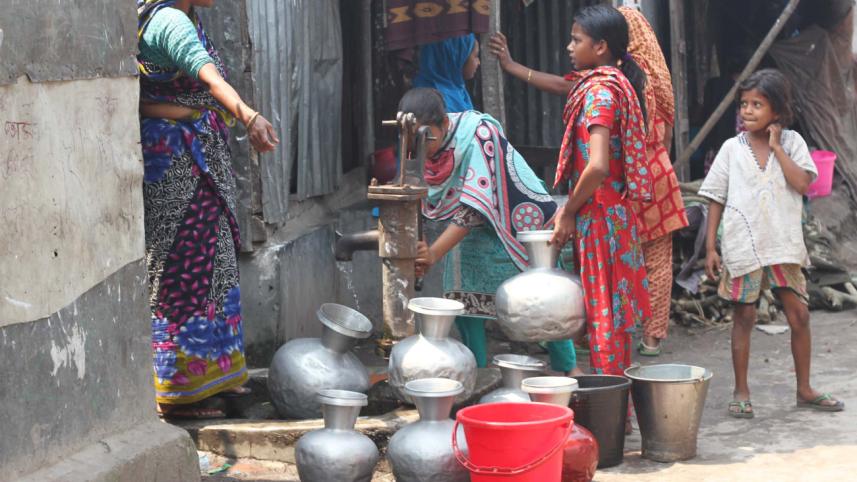Acute water crisis cripples Barisal city

For the last one month, people of Barisal city have been facing an acute water crisis. The ongoing scarcity of the supply of water has almost crippled their lives.
"We have no supply of running water, and have to run around desperately to get water, which becomes extremely strenuous," said Mamtaz Begum, a resident of Jhautala.
Acknowledging the crisis, Manirul Alam Swapan, executive engineer of water supply department of Barisal City Corporation, said at least one lakh families living on around 40 thousand holdings in a 45 square kilometer area have a demand for 1.20 core gallons of water per day.
Construction of high-rise residential, commercial and official buildings in a growing Barisal city is increasing extraction of ground water, he told this correspondent.
BCC's highest capacity of supplying is 40-45 lakh gallons to 1.5 lakh people living in 16,000 holdings by extracting ground waters through 33 out of 36 deep tubewells and submersible pumps. The 3.5 lakh dwellers living on about 24,000 holdings are deprived of getting the BCC water supply and have to depend on canals, ponds, street hydrants, shallow and deep tubewells, said BCC sources.
Ganesh Dutta, a resident of Swa Road area alleged that the trend of unplanned tubewells are one of the main reasons for the fall of water level, which is now at 800-1000 feet, while it was 400-800 feet just a decade ago.
"Besides morning, there is no water from the tubewells. We have to stand in line for long hours to get water," said a frustrated Arati Majumder of Kaunia Club Road area.
Public Health Engineering Department in 2007 planned to construct two surface water treatment plants (SWTP) with a capacity of refining 40 lakh gallons of waters in each from the Kirtankhola River, BCC sources said.
Construction work of SWTP at Amanatgant at the cost of Tk 19.22 core was to be completed but for the lack of electricity connection the plant is not functioning. However SWTP at Rupatali at the cost of Tk 30.78 crore is almost at the final stage.
SM Iqbal, a city dweller and a civic right activist, emphasised on speedy installation of the water treatment plants and excavation of canals, preservation of ponds and other water bodies to use surface water sources for mitigating demands of sufficient safe water supply.



 For all latest news, follow The Daily Star's Google News channel.
For all latest news, follow The Daily Star's Google News channel.
Comments